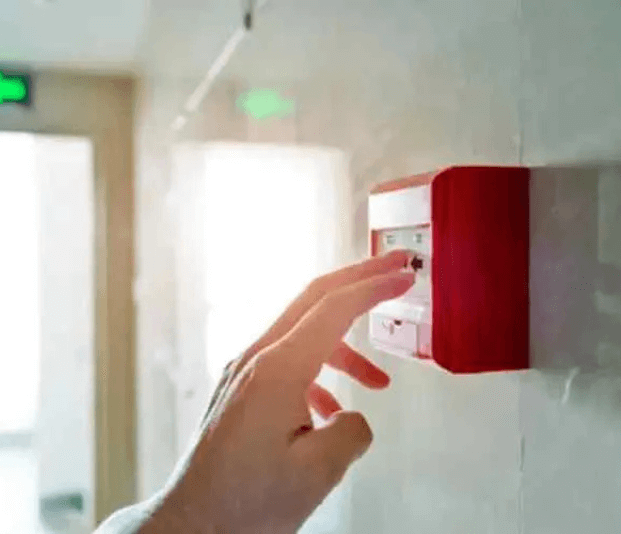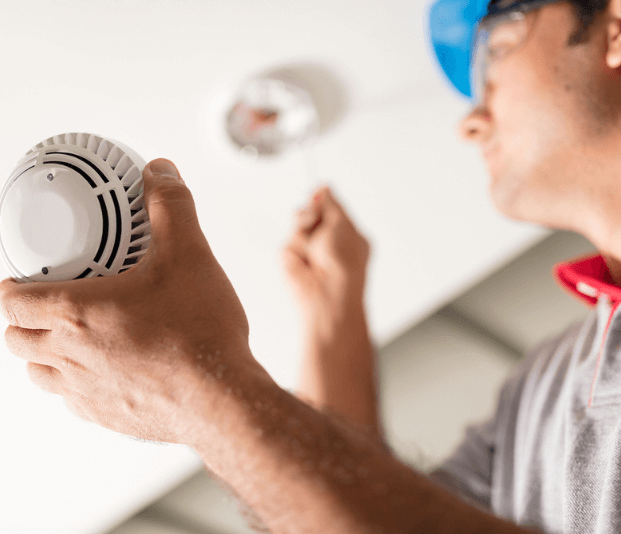What is a fire alarm device and how does it work?

The fire alarm is the silent guardian that can save lives and property in emergencies; it is one of the most important safety tools in homes and facilities, as it detects fires at their early stages.
But how does this device work, and how does it detect danger quickly? In this article, we will review how a fire alarm works and its importance in disaster prevention.
What is a Fire Alarm and How Does it Work?
A fire alarm is a safety system specifically designed to detect fire in its early stages and alert people in the facility to avoid injuries or damage.
The device works through specialized sensors that detect smoke, heat, or flame. When any of these signs are detected, the device emits a loud audible alarm, and in some systems, a visual alarm (such as flashing lights) is activated.
Alsafi Company ensures to provide the best and highest quality fire alarm devices that help you protect your facility from sudden fires.
What are the Types of Fire Alarms?
There are several types of fire alarm devices designed to meet different needs; the most common types include:
-
Manual Fire Alarms:
These devices are activated manually by pressing the emergency button located in prominent locations within the building.
They are used in cases where a person notices a fire before automatic devices can detect it.
-
Automatic Fire Alarms:
These devices are designed to operate automatically once fire signals are detected, such as smoke or rising temperatures.
They use sensitive sensors that activate the system without human intervention, providing a fast response at the start of a fire.
-
Wireless Fire Alarms:
These devices rely on wireless communication to connect detectors to the central panel. They are ideal for homes and small facilities, as they simplify installation and reduce the need for wiring, providing flexibility in detector placement.
-
Integrated Fire Alarm Systems:
These devices monitor multiple factors such as smoke, heat, and toxic gases. They are the most comprehensive and secure option for large facilities, providing multi-level protection and faster, more effective responses to various fires.
If you are looking for a specialized company to install and maintain early fire alarm devices for homes, offices, or other institutions regardless of the device type; contact us now.
Components of a Fire Alarm

A fire alarm consists of essential components that work together to detect fires and alert people when they occur. The components include:
- Smoke and Heat Detectors: Advanced sensors that detect changes in smoke or heat levels in the air.
- Control Panel: Receives signals from detectors and activates the alarm.
- Audible and Visual Notification Devices: Emit loud alarms or flashing lights to alert people.
- Power Source: Operates on electricity or batteries to ensure continuous operation even during power outages.
How to Stop a Fire Alarm
Sometimes a fire alarm may sound accidentally, and you need to stop it. To do so, follow these steps:
- Verify the Cause: Ensure there is no actual fire before turning off the device.
- Access the Control Panel: Use the control panel to stop the alarm by entering the system’s secret code.
- Reset the System: Once confirmed safe, reset the device to ensure proper functioning.
How to Design a Fire Alarm System?
Designing a fire alarm system for facilities is not just assembling devices, but a precise engineering process starting with understanding the location and ending with building a smart system capable of responding in critical moments. Therefore, each system differs based on the facility type.
The basic components of any effective fire alarm system include:
- Control Panel: Coordinates between devices and issues commands.
- Detectors: Sense smoke, heat, or flames and send signals to the panel.
- Audible and Visual Alarms: Alert occupants immediately upon detecting danger.
- Backup Power Source: Ensures operation even during power outages.
Design steps include:
- Determine the proper location for the control panel for easy access and fast response.
- Distribute detectors accurately to cover all hazard areas without blind spots according to facility activity.
- Choose locations for audible and visual alarms to reach all occupants, even in noisy or isolated areas.
- Integrate the system with building automation, such as elevators and ventilation, to cut operation and facilitate evacuation automatically.
- Test the system to ensure compliance with Saudi Civil Defense and NFPA international standards.
You can contact us at Alsafi Company for the best security and safety system services.
Fire Alarm Prices
Fire alarm prices vary based on several factors, including:
- Device Type: Manual devices are cheaper than automatic or integrated ones.
- Number of Detectors: More detectors increase the cost.
- Technologies Used: Devices with advanced technologies, such as wireless or multi-sensing alarms, are more expensive.
- Brand: Different brands offer various prices.
How to Install Fire Alarm Devices
Installing fire alarm devices requires high precision and technical expertise to ensure full site coverage and system responsiveness at critical moments. The essential installation steps include:
-
Identify Critical Locations Within the Facility
Select detector locations carefully, such as hallways, electrical rooms, kitchens, storage areas, and server rooms, to ensure early fire detection.
-
Choose the Appropriate System and Equipment
This includes the control panel, smoke or heat detectors, alarm bells, visual signaling units, heat-resistant cables, and necessary accessories, ensuring compatibility with the size and nature of the facility.
-
Connect Devices According to Specifications
Cables are laid according to an approved engineering plan, following manufacturer instructions and local electrical standards to ensure safe connections and optimal performance.
-
Comprehensive System Testing After Installation
Activate the detectors to verify the correct response of the control panel and audible/visual devices, documenting the test results.
-
Integrate with Other Building Systems
Connect the fire alarm system to other building systems, such as elevators, air conditioning, and ventilation, to enable automatic actions during emergencies.
-
Schedule Regular Maintenance
This ensures system efficiency; sensors are inspected, components cleaned, and batteries tested regularly according to manufacturer guidelines.
Hiring an accredited specialized company like Alsafi Company ensures each installation step follows the technical specifications approved by Civil Defense, providing a safe and effective fire alarm system when needed.
Best Company for Fire Alarm Maintenance and Installation
Alsafi Security and Safety Systems is one of the top companies specialized in fire alarm maintenance and installation, offering comprehensive solutions to ensure facility safety at the highest standards. Key advantages include:
- Extensive Experience: Long-standing experience in installing and maintaining fire alarms in various facilities in Jeddah.
- Advanced Technology: Uses the latest technologies to ensure precise and effective system installation.
- Specialized Team: Qualified engineers and technicians provide high-quality service.
- Fast Service: Efficient and timely maintenance and installation services.
- Continuous Support: Regular maintenance ensures long-term device efficiency.
- Compliance with Standards: Fully adheres to Civil Defense and official standards to ensure facility safety.
If you are looking for reliable fire alarm installation or maintenance services, Alsafi Company is the ideal choice for maximum safety.
Read about: Maintenance Contracts
In summary, installing a fire alarm in your property is a necessary step to protect people and property from sudden incidents. These devices help detect fire early, providing enough time for evacuation or control before it spreads.
Frequently Asked Questions About Fire Alarms
Can a fire alarm be used in homes?
Yes, a home fire alarm is one of the best ways to protect your family.
How is a fire alarm installed?
Fire alarms are installed by certified safety technicians to ensure compliance with standards.
What are the benefits of a fire alarm?
Fire alarms help detect fires early, protect lives and property, and reduce losses.
Do fire alarms require batteries?
Yes, some devices rely on batteries as a backup power source.
Can a fire alarm work during a power outage?
Yes, some alarms operate on batteries to ensure continuous operation.
How can I choose the right fire alarm?
It is recommended to consult safety experts to select the most suitable system based on the facility’s size and type.



